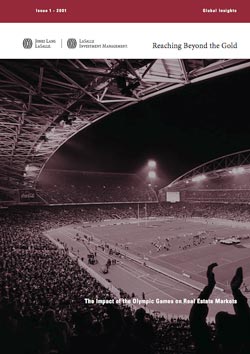Last Friday I was part of a panel on WBEZ discussing Chicago’s failed Olympic bid. Asked to anticipate the impact of the decision on the local housing scene, I responded essentially as I would have had Chicago emerged a winner: Not much.
In 2001, in what remains the most thorough study of the subject, Jones Lang LaSalle, the real-estate services firm, concluded that the impact of the games on residential real estate would be felt not so much on house prices as on “the development of new districts within the Olympic precinct.” That effect, the report noted, would occur mostly in burgeoning cities, where whole new neighborhoods could be built. More developed cities would experience a long-term effect, with neighborhoods near the Olympics venues benefiting both from upgrades in their infrastructure and from the emotional afterglow of Olympic glory.
Had Chicago been selected, clusters of new facilities would have arisen in two parts of town: Washington Park, the anticipated site of an aquatics center and a temporary 80,000-seat Olympic stadium; and the former Michael Reese Hospital campus, where 16,500 athletes and team officials would have bedded down at the Olympic Village.
The impact on housing values around Washington Park likely would not have been huge, even though some people were hoping for a spike. It’s already one of the South Side’s most appealing neighborhoods, with handsome old housing stock—admittedly, some of it in bad decline—and easy access to Lake Michigan and public transportation. The long-term effects of improved infrastructure would have been nice, but like other Chicago communities, the neighborhood would have been left to struggle with lingering issues of race and school quality. (Last week, Rochelle Vayo Adkinson, my colleague at CLTV’s HomesPlus, blogged that she found one real-estate listing that included a map to show that the stadium and aquatics center would be within walking distance of the property.)
As for the $1.1-billion Olympic Village, it would have plugged a crucial gap in the swath of new housing built along the south lakefront over the past decade. Some of those areas are suffering from a glut now, but by 2016, the market might have been ready for a new round of homes. Nevertheless, you have to wonder what’s going to happen now on that site, which the city bought for $86 million. While the bid was alive, officials insisted that the property would be upgraded—the idea was to resell the property to a developer—regardless of whether the Olympics came to town. But the combined timing of Chicago’s elimination from Olympic consideration and the prolonged drought in the residential real-estate market suggests that it could be a long time before that happens.
ALSO: While still in the throes of wondering what some other city’s got that we don’t, check out what the value of your home might buy in other U.S. cities. Coldwell Banker now has a Home Price Comparison Index, where you can pull up listings at your price range in any of 340 other North American markets.



